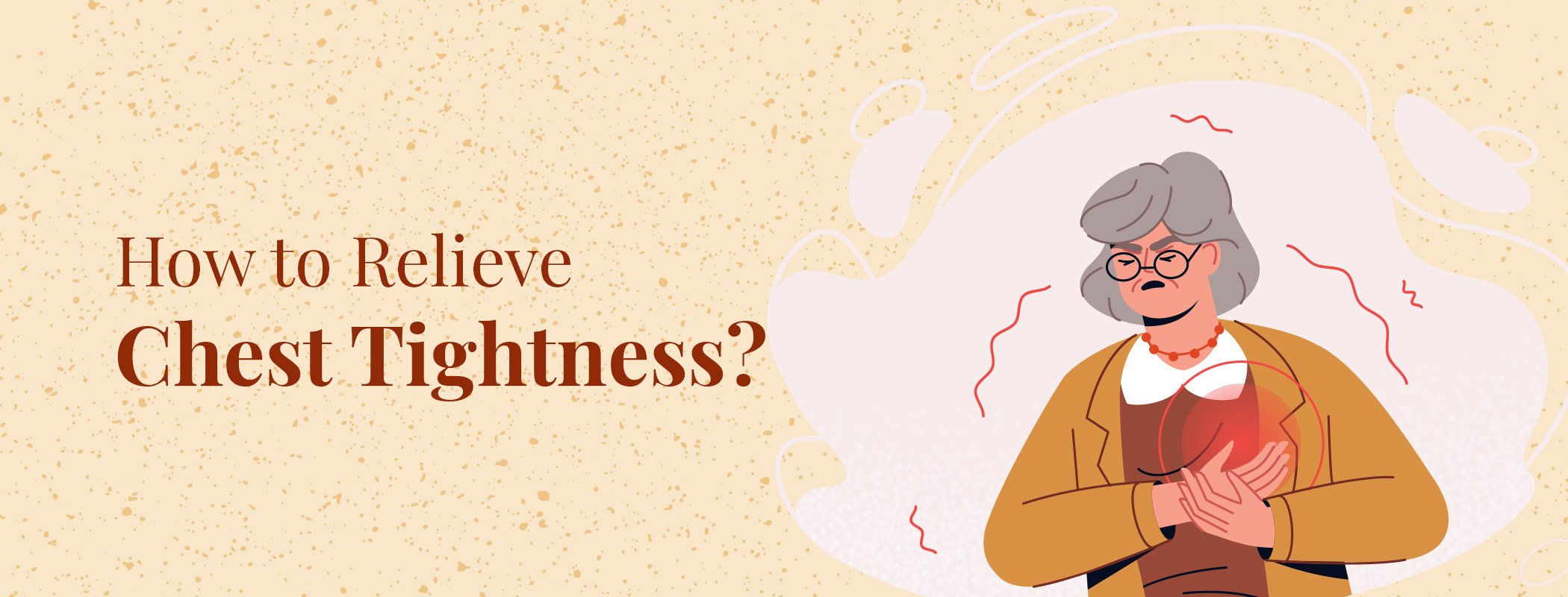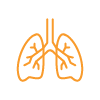How to Relieve Chest Tightness?
March 4, 2025

Chest tightness refers to a sensation of pressure or constriction in the chest area. It may feel like a band around the chest or a weight pressing on the chest. People often describe it as feeling squeezed or having difficulty taking deep breaths. Chest tightness can occur suddenly or develop gradually, and other symptoms may accompany it.
Causes
There are various causes of chest tightness, including:
- Anxiety or stress
- Asthma or allergies
- Acid reflux or gastroesophageal reflux disease (GERD)
- Cardiac tamponade
- Coronary Artery Disease
- Costochondritis
- Collapsed lungs or Pneumothorax
- Esophageal spasm
- Esophageal hypersensitivity
- Esophageal rupture
- Gallstones
- Heart-related issues, such as a heart attack or angina
- Hiatal hernia
- Hypertrophic cardiomyopathy
- Muscle strain or tension
- Mitral valve prolapse
- Pancreatitis
- Pericarditis
- Pneumonia
- Pulmonary embolism
- Pulmonary hypertension
- Panic attacks or anxiety disorders
- Pleuritis
- Respiratory infections, such as bronchitis or pneumonia
- Rib fracture
- Shingles
- Trouble swallowing
- Ulcers
Symptoms
Chest tightness may accompany other symptoms, which can vary depending on the underlying cause. Common symptoms include:
- Shortness of breath or difficulty breathing
- Chest pain or discomfort
- Rapid heartbeat or palpitations
- Sweating
- Dizziness or lightheadedness
- Nausea or indigestion
Risk Factors
Various factors can contribute to a higher risk of chest tightness. These include:
- Smoking or exposure to secondhand smoke.
- Obesity or being overweight.
- Leading an inactive lifestyle or engaging in minimal physical activity.
- Family history of heart disease or respiratory conditions.
- High levels of stress or anxiety.
- Poorly controlled asthma or allergies.
Home Remedies
- Deep Breathing Exercises: Practice slow, deep breaths to help relax your chest muscles and improve airflow. Take a deep breath through your nose, hold it for a few seconds, then slowly exhale through your mouth.
- Relaxation Techniques: Practice meditation, progressive muscle relaxation, or yoga to ease stress and enhance relaxation, helping to relieve anxiety-related chest tightness.
- Warm Compress: By using a warm compress on your chest, you can loosen muscles and reduce tightness. You can use a hot water bottle or a warm towel for this purpose. Make sure the compress is warm, not hot, to prevent burns.
- Herbal Tea: Certain herbal teas have soothing properties that can help ease chest tightness. Chamomile tea offers calming benefits, while peppermint tea can help soothe chest muscles.
- Hydration: Staying hydrated is essential for overall health, including respiratory function. Staying hydrated helps loosen mucus, enhance airflow, and ease chest congestion.
- Avoid Triggers: Recognize and steer clear of factors that can aggravate chest tightness. These can include allergens, irritants like smoke or chemical fumes, and certain foods that may contribute to acid reflux.
- Healthy Diet: Maintaining healthy respiratory function requires a well-balanced diet. Consuming antioxidant-rich foods like fruits, vegetables, and nuts can help minimize inflammation and support lung health. Additionally, consuming omega-3-rich foods like fatty fish and flaxseeds may help lower inflammation and promote better respiratory health.
- Regular Exercise: Engaging in regular exercise enhances lung capacity and supports cardiovascular well-being. Incorporate moderate activities like brisk walking or swimming to gradually ease chest tightness and improve respiratory health.
- Humidifier: Using a humidifier in dry environments may help maintain moisture in the air, reducing respiratory irritation and relieving chest tightness.
Foods to Relieve Chest Tightness
- Ginger: Known for its anti-inflammatory properties, ginger will help lower inflammation in the airways and ease chest tightness. You can consume it as tea or incorporate it into your meals.
- Turmeric: This spice contains curcumin, a compound with potent anti-inflammatory effects. Incorporating turmeric into your meals or consuming turmeric tea can aid in easing chest tightness.
- Garlic: Garlic possesses anti-inflammatory and antioxidant benefits that support respiratory health. Incorporate garlic into your cooking or consume it raw for potential benefits.
- Honey: Honey has calming effects and can help alleviate coughing and irritation in the respiratory system. Stir a spoonful of honey into warm water or herbal tea to enjoy its additional soothing benefits.
- Leafy Green Vegetables: Spinach, kale, and broccoli are nutrient-dense greens loaded with antioxidants and vitamins that contribute to healthy lung function. Include them in your meals as salads, stir-fries, or smoothies.
- Fatty Fish: Omega-3-rich fish like salmon, mackerel, and sardines offer anti-inflammatory benefits that may help ease chest tightness.
- Citrus Fruits: Lemons, grapefruits, and oranges are rich in vitamin C, which helps promote lung health and combat inflammation. Enjoy them as fresh fruits, or squeeze them into water for a refreshing drink.
- Nuts and Seeds: Almonds, walnuts, flaxseeds, and chia seeds contribute to better respiratory health and help combat inflammation due to their high content of omega-3 fatty acids and antioxidants. Snack on these nutritious options or sprinkle them over salads or yogurts.
- Green Tea: Green tea, abundant in antioxidants, may aid in reducing inflammation and enhancing lung health. Sipping a cup daily can help you experience its potential benefits.
- Oats: Oats are rich in fiber and will help regulate digestion, which may indirectly alleviate chest tightness related to acid reflux. Start your day with a bowl of oatmeal for a nourishing breakfast.
It’s important to note that these home remedies and dietary suggestions may provide relief for mild cases of chest tightness. It is important to consult a healthcare professional for an accurate diagnosis and suitable treatment if you have persistent or severe symptoms.
When to Consult a Doctor?
1. Seek Immediate Medical Attention:
- Sudden, intense chest tightness or pressure, particularly if it spreads to your arm, jaw, or neck, could be signs of a heart attack.
- If you have difficulty breathing, persistent shortness of breath, or chest tightness accompanied by lightheadedness, dizziness, or fainting.
2. Consult a Healthcare Professional:
- If you have recurring or persistent chest tightness that is not related to a known medical condition.
- If your chest tightness is accompanied by other concerning symptoms, such as fever, coughing up blood, rapid heart rate, or significant weight loss.
- If you have a history of heart disease, asthma, chronic obstructive pulmonary disease (COPD), or other respiratory conditions, your healthcare provider can help manage your specific situation.
3. Who to Consult:
- Begin by visiting your primary care physician or general practitioner, who can evaluate your symptoms, perform a physical examination, and suggest any necessary diagnostic tests or refer you to a specialist if required.
- Depending on the suspected cause of your chest tightness, you may be referred to a cardiologist for heart-related concerns, a pulmonologist for respiratory conditions, or a gastroenterologist for digestive issues like acid reflux.
It’s important to note that this is general guidance, and individual cases may vary. If you have concerns or uncertainties about your symptoms, it’s important to consult a healthcare professional for an accurate diagnosis and proper treatment.







